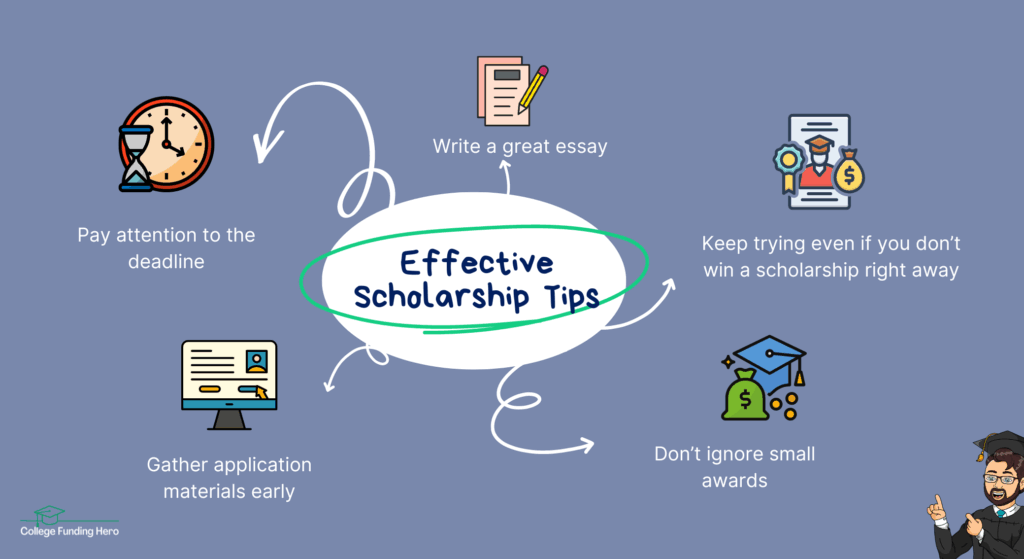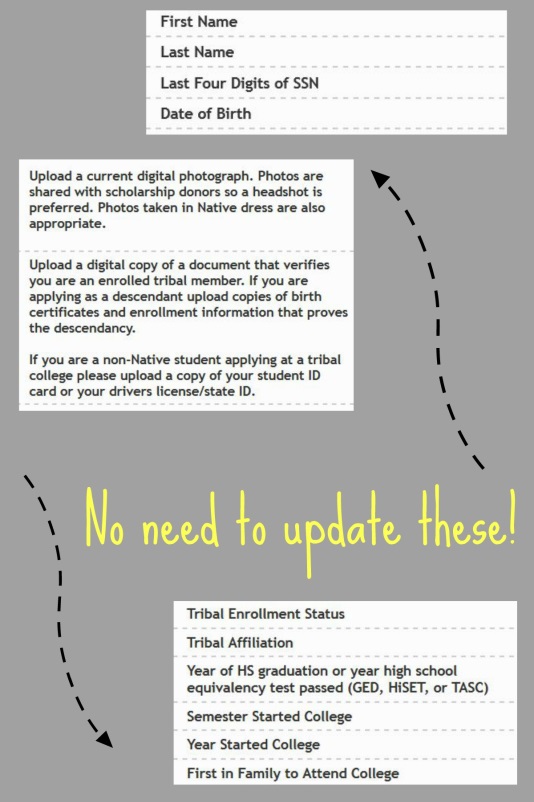Essential Tips for First-Time Scholarship Applicants

Embarking on the scholarship application journey can feel daunting, especially for first-timers. The process involves navigating complex requirements, crafting compelling essays, and standing out amongst a sea of other deserving candidates. Fear not! This article serves as your essential guide, demystifying the application process and equipping you with the knowledge to maximize your chances of success. We'll delve into critical areas like researching relevant scholarships, mastering the art of personal statements, securing strong recommendation letters, and meticulously managing deadlines. Prepare to transform from a novice applicant to a confident contender, ready to seize those valuable scholarship opportunities.
Essential Tips for First-Time Scholarship Applicants
Navigating the scholarship application process for the first time can seem daunting, but with careful planning and execution, you can significantly increase your chances of success. The key is to approach each application strategically, highlighting your strengths and demonstrating why you deserve the financial assistance. Remember to start early, manage your time effectively, and tailor your application to each specific scholarship's criteria. Attention to detail and a genuine portrayal of yourself are crucial elements to consider throughout the process.
Understand Scholarship Requirements
Before diving into applications, thoroughly research and understand the eligibility criteria for each scholarship. This includes academic qualifications, GPA requirements, field of study, residency, and any specific demographic criteria. Failing to meet these requirements will result in immediate disqualification, wasting your time and effort. Pay close attention to the essay prompts and any required supporting documents, ensuring you gather everything necessary well in advance of the deadline. Understanding these specifics allows you to prioritize applications for which you are a strong candidate.
Craft a Compelling Essay
The essay is often the most important part of your scholarship application, providing an opportunity to showcase your personality, experiences, and goals. Tell a story that is authentic and engaging, highlighting your unique qualities and what sets you apart from other applicants. Address the essay prompt directly and provide concrete examples to support your claims. Proofread carefully for grammar and spelling errors, and seek feedback from trusted friends, family members, or mentors to ensure your essay is clear, concise, and impactful.
Highlight Your Achievements
Scholarship committees are looking for students who have demonstrated a commitment to academic excellence, extracurricular activities, and community involvement. Showcase your achievements by providing specific examples of your accomplishments and the impact you have made. Quantify your achievements whenever possible (e.g., "increased club membership by 30%"). Don't be afraid to brag a little, but be sure to do so in a humble and genuine manner. Emphasize the skills and qualities you have developed through these experiences and how they will contribute to your future success.
Secure Strong Letters of Recommendation
Letters of recommendation provide an external validation of your skills, character, and potential. Request letters from individuals who know you well and can speak to your strengths and accomplishments. Provide them with ample time to write a thoughtful and detailed letter, along with relevant information about the scholarship and your background. Choose recommenders who can offer specific anecdotes and examples that support your application. Follow up with them to ensure they have submitted the letter by the deadline.
Proofread and Submit on Time
Attention to detail is crucial in scholarship applications. Proofread your application thoroughly for any errors in grammar, spelling, or punctuation. Ensure that all required documents are included and that your application is complete and accurate. Submit your application well before the deadline to avoid any technical issues or unforeseen circumstances. Late or incomplete applications are often automatically disqualified.
| Tip | Description |
|---|---|
| Research Requirements | Understand the eligibility criteria for each scholarship before applying. |
| Craft Compelling Essay | Tell an authentic and engaging story highlighting your unique qualities. |
| Highlight Achievements | Showcase your accomplishments and the impact you have made. |
| Secure Recommendations | Request letters from individuals who know you well and can speak to your strengths. |
| Proofread & Submit On Time | Ensure your application is complete, accurate, and submitted before the deadline. |
What is the #1 way to increase your chances for a scholarship?

Academic Excellence and Transcripts
Your academic record is the first thing scholarship committees will review. Maintain a high GPA by prioritizing your studies and seeking help when needed. Demonstrate a commitment to learning and take challenging courses that showcase your intellectual curiosity. Furthermore, ensure your transcripts are accurate and properly submitted. This will show the committee that you are serious about your education.
- Strive for top grades in all your courses.
- Take challenging courses to showcase your abilities.
- Request official transcripts well in advance of deadlines.
Crafting a Compelling Personal Essay
The personal essay is your opportunity to shine and distinguish yourself from other applicants. Use it to tell your unique story, highlight your personal qualities, and explain why you deserve the scholarship. Be authentic, vulnerable, and specific. Clearly articulate your goals and how the scholarship will help you achieve them. Don't forget that your essay is how you can show your true personality to the committee.
- Brainstorm ideas and outline your essay before writing.
- Focus on a specific theme or narrative that showcases your strengths.
- Get feedback from teachers, mentors, or writing centers.
Targeted Research and Application Strategy
Don't apply for every scholarship you find. Instead, focus on scholarships that align with your academic interests, career goals, and personal background. Research the scholarship providers to understand their mission and values. Tailor your application materials to each specific scholarship. This increases your chances of standing out from the competition. Making sure you're applying to the right places is incredibly important.
- Use online databases and resources to find relevant scholarships.
- Research the scholarship providers and their selection criteria.
- Customize your application materials for each scholarship.
Demonstrating Extracurricular Involvement and Leadership
Scholarship committees are looking for well-rounded individuals who are actively engaged in their communities. Participate in extracurricular activities that demonstrate your interests, skills, and leadership abilities. Take on leadership roles whenever possible and showcase your commitment to making a difference. Showing that you are not only book smart but also have real-world skills is a massive plus.
- Join clubs, organizations, or sports teams that align with your interests.
- Volunteer in your community or participate in service projects.
- Seek out leadership opportunities within your extracurricular activities.
Securing Strong Letters of Recommendation
Letters of recommendation can significantly strengthen your scholarship application. Request letters from teachers, mentors, or employers who know you well and can speak to your academic abilities, personal qualities, and potential. Provide your recommenders with ample time and information to write compelling letters. Make sure your letters show the committee that you are highly regarded.
- Choose recommenders who know you well and can write strong letters.
- Provide your recommenders with a resume, personal statement, and deadlines.
- Follow up with your recommenders to ensure they submit their letters on time.
What will you need to prepare for when you start applying for scholarships?

Academic Transcripts and Records
Gathering all necessary academic records is crucial. This includes:
- Official Transcripts: Request official transcripts from all high schools, colleges, or universities you've attended. Allow ample time for processing and delivery, as some institutions can be slow.
- Standardized Test Scores: Collect your SAT, ACT, or other standardized test scores if required by the scholarship. Ensure you have access to official score reports.
- GPA Calculation: Accurately calculate your Grade Point Average (GPA). Some scholarships require a minimum GPA for eligibility.
Compelling Personal Essays
Your essays are your chance to shine and tell your story. Preparation includes:
- Brainstorming Ideas: Spend time brainstorming potential essay topics that highlight your achievements, experiences, and aspirations.
- Crafting a Narrative: Develop a compelling narrative that showcases your personality, skills, and values. Focus on answering the essay prompt directly and providing concrete examples.
- Seeking Feedback: Have teachers, mentors, or writing center staff review your essays for clarity, grammar, and overall effectiveness.
Understanding Eligibility Criteria
Thoroughly understanding the eligibility criteria for each scholarship is vital. This means:
- Reviewing Requirements: Carefully review all requirements, including GPA, residency, major, and other specific qualifications.
- Identifying Suitable Scholarships: Identify scholarships for which you are a good fit based on your background, interests, and academic achievements.
- Avoiding Disqualification: Double-check that you meet all criteria before applying to avoid disqualification.
Meeting Application Deadlines
Missing deadlines is a common mistake. Effective preparation involves:
- Creating a Timeline: Create a timeline for each scholarship application, noting all deadlines for submissions, recommendations, and other required materials.
- Setting Reminders: Set reminders to ensure you complete each step of the application process on time.
- Submitting Early: Aim to submit your applications well before the deadline to avoid last-minute technical issues or delays.
Letters of Recommendation
Strong letters of recommendation can significantly enhance your application. Prepare by:
- Identifying Recommenders: Identify teachers, professors, or mentors who know you well and can speak to your abilities and character.
- Providing Information: Provide your recommenders with ample information about your accomplishments, goals, and the scholarships you're applying for. Give them copies of your resume and personal essay.
- Giving Sufficient Notice: Request recommendations well in advance of the deadline to give your recommenders enough time to write thoughtful and compelling letters.
What not to say in a scholarship application?

Lack of Clear Goals and Ambitions
It is essential to articulate a well-defined path for your future. A lack of specific goals signals a lack of direction. Scholarship committees want to invest in students with a clear vision.
- Avoid saying "I'm not sure what I want to do yet." This indicates a lack of planning.
- Instead of saying "I just want to get a good job," articulate specific career goals.
- Refrain from saying "I haven't really thought about the future." This portrays a lack of foresight.
Unprofessional Tone and Language
Your scholarship application is a formal document, and requires professional language. Informal language or slang shows disrespect for the committee and the selection process.
- Never use slang, like "I'm gonna..." or "It was totally awesome."
- Avoid overly casual language. Maintain a formal tone throughout the application.
- Don't include jokes or overly personal anecdotes. Keep the focus on your accomplishments and qualifications.
Focusing Solely on Financial Need (Without Connecting to Merit)
While financial need might be a factor, the scholarship committee also considers your academic achievements, leadership potential, and commitment to your field of study.
- Avoid phrases like "I desperately need this scholarship." Highlight how you deserve the award.
- Don't only talk about financial difficulties. Showcase your accomplishments and how the scholarship will help you.
- Refrain from implying that the scholarship is your only option. Demonstrate your ability to succeed regardless of financial assistance.
Blaming Others for Failures or Shortcomings
Taking responsibility for your own actions is a mark of maturity and self-awareness. Blaming others shows a lack of accountability and can be a major red flag.
- Avoid saying "My teacher was bad, so I failed the class." This shifts responsibility to others.
- Don't blame your parents or circumstances for your shortcomings. Focus on what you have done to overcome challenges.
- Refrain from making excuses. Acknowledge any weaknesses, but emphasize the steps you've taken to improve.
Lack of Specific Examples and Evidence
General statements without supporting evidence lack credibility. The selection committee needs concrete evidence to support your claims and assertions.
- Avoid saying "I am a hard worker" without providing specific examples of your work ethic.
- Don't just say "I am a leader." Describe your leadership roles, initiatives, and outcomes.
- Refrain from making broad claims without specific details. Support your claims with concrete examples and quantifiable results.
Frequently asked questions
What are the most common mistakes first-time scholarship applicants make?
Many first-time applicants fail to thoroughly read the eligibility criteria and application instructions, leading to disqualification. They also often submit generic essays that don't highlight their unique qualities or demonstrate a strong connection to the scholarship's mission, and neglect to proofread carefully, resulting in avoidable errors.
How important are extracurricular activities in a scholarship application?
Extracurricular activities are highly important as they showcase your interests, skills, and commitment outside of academics. Participating in clubs, sports, volunteer work, or other activities demonstrates leadership, teamwork, and a well-rounded personality, making you a more attractive candidate to scholarship committees.
What is the best way to write a compelling scholarship essay?
The best way to write a compelling scholarship essay is to tell a genuine and engaging story that highlights your experiences, goals, and aspirations. Focus on demonstrating how the scholarship will help you achieve your academic and career objectives, and be sure to answer the essay prompt directly and provide specific examples to support your claims.
How early should I start preparing for scholarship applications?
You should start preparing for scholarship applications as early as possible, ideally in your junior year of high school or even earlier. This allows you ample time to research available scholarships, gather necessary documents (transcripts, letters of recommendation, etc.), and craft thoughtful and personalized essays, increasing your chances of success.
